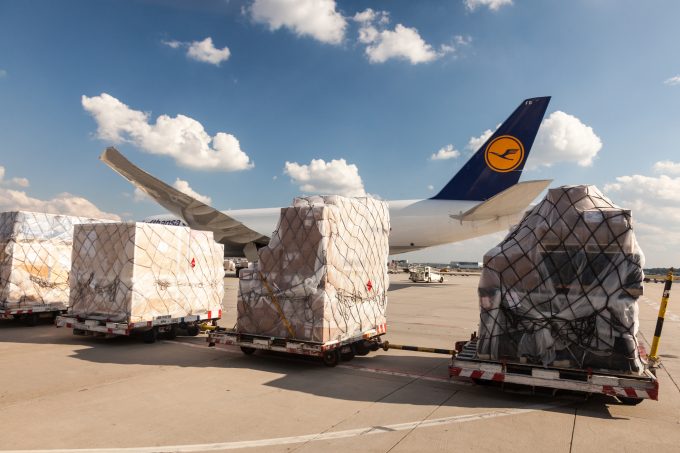Air cargo shifts capacity to where the money is as holiday season begins
Airlines are shifting capacity to Asia Pacific-North America as disruption from China’s forthcoming Golden Week ...
GM: RAISING THE ROOF GGM: IN FULL THROTTLE GZIM: MAERSK BOOST KNIN: READ-ACROSSMAERSK: NOT ENOUGHMAERSK: GUIDANCE UPGRADEZIM: ROLLERCOASTERCAT: HEAVY DUTYMAERSK: CATCHING UP PG: DESTOCKING PATTERNSPG: HEALTH CHECKWTC: THE FALLGXO: DEFENSIVE FWRD: RALLYING ON TAKEOVER TALKODFL: STEADY YIELDVW: NEW MODEL NEEDEDWTC: TAKING PROFIT
GM: RAISING THE ROOF GGM: IN FULL THROTTLE GZIM: MAERSK BOOST KNIN: READ-ACROSSMAERSK: NOT ENOUGHMAERSK: GUIDANCE UPGRADEZIM: ROLLERCOASTERCAT: HEAVY DUTYMAERSK: CATCHING UP PG: DESTOCKING PATTERNSPG: HEALTH CHECKWTC: THE FALLGXO: DEFENSIVE FWRD: RALLYING ON TAKEOVER TALKODFL: STEADY YIELDVW: NEW MODEL NEEDEDWTC: TAKING PROFIT

Lufthansa Cargo has erased 2016’s dire numbers from its memory as it announced one of its most successful years to date.
Operating profits for the 12 months to December 2017 hit €242m – a stark contrast to the €50m loss it reported a year ago.
Chief executive Peter Gerber said 2017 had developed into one of the “most successful” years in the history of Lufthansa Cargo.
“We have achieved impressive earnings and, in the volatile logistics business, our team demonstrated high professionalism and passionate commitment,” said Mr Gerber.
“For the current year, we will therefore remain focused on pursuing our efficiency programme and investing in our future.”
Sales, in revenue tonne km (RTKs), rose by 7.4%, far outstripping the 3.3% growth in capacity, with the carrier handling some 1.6m tonnes leading to €2.54bn in revenues, up 21.1% on 2016.
However, its RTKs were still some way below industry average, with European sales down 0.4% compared with average industry growth of 11.8%.
Operating expenses crept up 6.7% to €2.4bn, with the price of fuel representing the biggest increase, up 25.9% to €326m. But growing costs were more than written off by the near 600% increase in ebit, while load factor also climbed 2.7% to 69.3%, amid heightened demand and yield increases of 14%.
Mr Gerber told The Loadstar that “clearly” the strong market for air freight played a hand in the carrier’s return to growth, but said there were other factors.
“We also underwent a successful restructuring, which took place while the market was down,” said Mr Gerber. “And we had nearly completed this process when the air freight market began to pick up again.”
The restructuring included reducing its employee count by some 800 and scrapping two of its MD-11 freighters. The carrier now operates a fleet of 12 MD-11Fs alongside five B777 freighters, and has plans to alter its fleet composition in the near future.
“We intend to bring in new cargo aircraft, but the question is ‘when?’,” Mr Gerber said. “For us it is good that we have these old MD-11 as it leaves us flexible – we can bring in new aircraft and drop the MD-11s if we need to reduce capacity.”
When asked about overcapacity, Mr Gerber said he could not foresee a repeat of the start of the decade, which saw the market flooded with capacity causing rates to plummet.
Amid the optimism, chief financial officer Martin Schmitt told The Loadstar the change in the market was “unforeseen” by the industry.
“Before the shift, what we had was very definitely a buyer’s market but now – especially after the November and December peaks – we have a seller’s market,” said Mr Schmitt. “It flipped the game in a fairly extreme and unforeseen way.”
Mr Gerber highlighted e-commerce as an important avenue for growth, noting that express operations had increased “considerably”.
“It is clear that this sector is strong and growing fast, and we expect to see more e-commerce volumes going forward,” he said. “We are looking to develop a special product that will improve our participation within this sector, and I do believe we will have a result soon.”
Neither Mr Gerber nor Mr Schmitt would offer much on the picture for the air freight market in the long term, but both were confident about the next quarter or so.
Citing “certain base factors”, Mr Gerber said he was anticipating growth of 3-4% for the next mid-term cycle, while Mr Schmitt said 2018 has started well.
“I cannot say how long we will see growth in the market, but the good times did not stop after Christmas, with IATA positive for the next few months at least,” he added.
“For Lufthansa Cargo, though, the biggest and most important season runs from November to December and this I can’t predict – we will see.”
Comment on this article